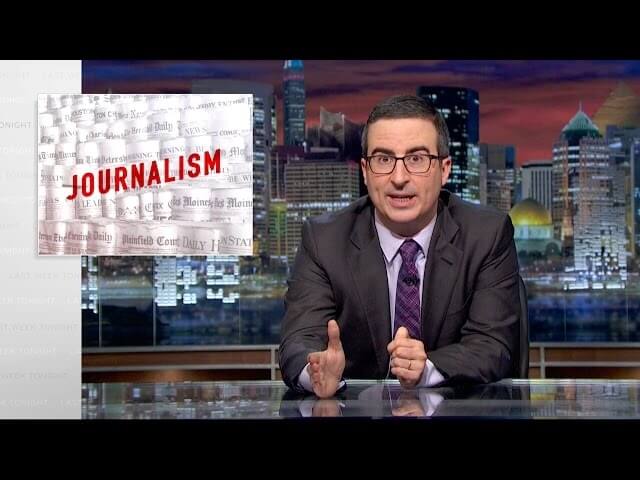John Oliver “investifarts” the imminent demise of print journalism

Print media has been in free fall for some time now—newspapers may have gotten a recent infusion of relevance with Spotlight’s win for Best Picture, but that Oscar gold has done little to shore up profits in the industry. Even the publications that first cried “digital first” haven’t offset the steep decline in ad revenues; the push toward online distribution has just been a lateral move, leaving most newspapers/sites vulnerable to (often) nonsensical rebranding.
It’s not just the fault of news aggregators and billionaires who have even more time than money on their hands to tinker with papers of record. Readers have also contributed to the current state of print journalism, mostly because our interest in paying for the news we so readily access via social media has tapered off even more than print ad revenues. Last Week Tonight apportioned some of the blame last night, as well as “investifarted” the roots of the problem, in a bitterly funny segment about the collapse of Western publications.
Print journalism may be a “lumbering dinosaur,” but it didn’t just march itself to extinction. Media companies have tried to adapt to this digital-leaning world with mixed, sometimes hilarious, results (Tronc, anyone?). But asking reporters to meet tweet and blog post quotas while also taking on corruption is stretching their already strained resources (not to mention tearing down the wall between advertising and journalism), which is presumably how the Boston Globe came to share that the FBI was “investifarting” dozens of leads in the wake of the Chattanooga shootings.
Ultimately, the only solution seems to be to pay for the news you consume, though that’s increasingly less likely to happen and/or help. But, as viewers watch his show on HBO (or YouTube), John Oliver asks that they consider that “[t]he media is a food chain that would fall apart without local newspapers.” Some of his most incisive segments wouldn’t exist without journalists like Harry Esteve, whose investigative reporting for The Oregonian on state lotteries led to the viral Last Week Tonight piece that debunked the myth that public schools are somehow supported by these windfalls. Esteve is no longer with The Oregonian—he’s now in education, which means he’s still standing in the figurative quicksand.
To keep things from getting too depressing, though, the show wraps up the segment with a Spotlight-inspired trailer that puts Jason Sudeikis in Liev Schreiber’s shoes and Bobby Cannavale in the predicament of Esteve and journalists everywhere.